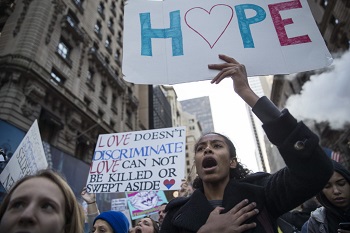Home » classism (Page 2)
Category Archives: classism
Stop the Hate Against AAPI Communities
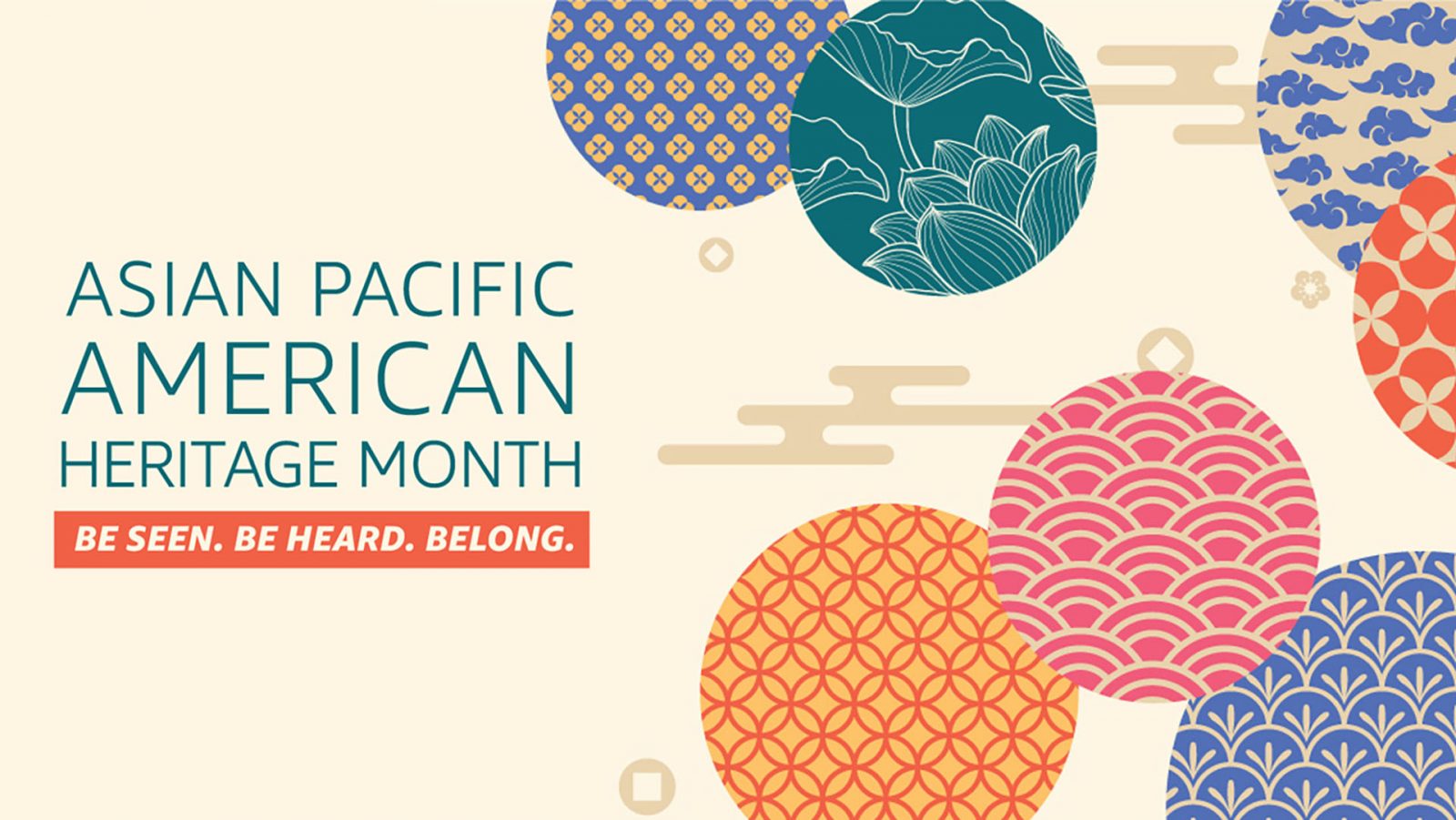 Systemic racism and acts of terror towards Asian Americans and Pacific Islanders have dominated media headlines in the past few months. Sadly, while hate incidents against the AAPI community have escalated in the past year, surpassing 6,000 reported incidents between 2020 and 2021, this not a recent occurrence in America.
Systemic racism and acts of terror towards Asian Americans and Pacific Islanders have dominated media headlines in the past few months. Sadly, while hate incidents against the AAPI community have escalated in the past year, surpassing 6,000 reported incidents between 2020 and 2021, this not a recent occurrence in America.
Anti-Asian sentiments, oppression and violence date back centuries.
The United States imported Chinese workers in the 19th Century to build the railroad system. Once it was built, the workers, who had been cheap sources of labor for employers, were seen as competition by many White working class Americans. The anti-Asian sentiments led to Chinese men and their families being driven from towns, lynched and subjected to newly passed anti-immigration laws.
We have witnessed anti-Asian sentiments becoming increasingly hostile during the pandemic, escalating from verbal to physical attacks to most recently, mass murder.
The belief that Asians carry disease and that they should return to Asia no matter how many generations their family has been in America is often shared on social media. Many Americans also confuse the concepts of country and continent and label Asians as a single demographic, all from the same place. This diminishes the rich and varied cultural beliefs, values, religions and spiritual traditions of the Asian diaspora.
Rich Culture(s)
There are many ethnic identities, cultures and languages within this diverse group of people. In the United States alone, this racial category, according to the Census, refers to more than 40 different ethnic groups. Moreover, in the past 40 years, there has been a widening of income inequality among Asian populations, which has led to social and economic consequences for some. Education and income levels vary widely among Asians. Although they rank as the highest earning racial and ethnic group in the United States, the wide and rapid economic divide belies the growing class differences within this group.*
One lingering remnant from the immigration laws restricting Asian migration within the United states is that a large percentage of Asians and Asian Americans still live in states where there were major points of entry for earlier Asian immigrants, such as New York, California and Hawaii.
While Asian migration throughout the United States has been more prevalent since the mid-1960s, when these laws were overturned, there are still places in the United States where Asians are viewed as exotic and foreign, and not “real” Americans. It is not incidental that people of Japanese descent in America, not German, were imprisoned in internment camps during World War II.
Next Steps for UUs?
What does this mean for us as UUs? We at UU Class Conversations believe that remaining true to our Principles will help break down divisions along class and racial lines. Creating an inclusive community for all racial and ethnic groups begins with meaningful and productive dialogue aimed at combatting racial and class injustice.
What do you see then as next steps for this work?
* Pew Research Center, July 12, 2018, “Income Inequality in the U.S. Is Rising Most Rapidly Among Asians.”
Unity Based on Justice
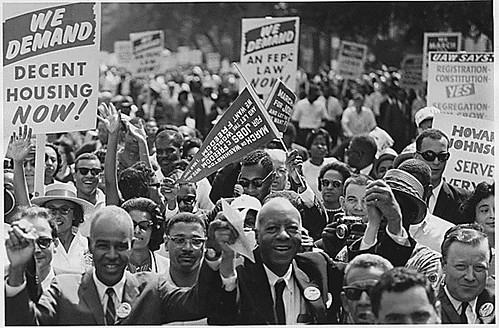 In July of 2020, UU Class Conversations published the blog post The Time to Unite as One America is Now about police brutality and the systemic oppression of Black and other people of color throughout the United States. It focused on how the deaths of black and brown men and women by police officers sparked international protests. The protesters were labelled terrorists, thugs and unpatriotic by some conservative media outlets and politicians.
In July of 2020, UU Class Conversations published the blog post The Time to Unite as One America is Now about police brutality and the systemic oppression of Black and other people of color throughout the United States. It focused on how the deaths of black and brown men and women by police officers sparked international protests. The protesters were labelled terrorists, thugs and unpatriotic by some conservative media outlets and politicians.
Just a few weeks earlier, some of the same media outlets and politicians had proffered a very different response when heavily armed, mostly White, protesters stormed the Michigan capitol building, threatening to kidnap and possibly kill the governor. Why? The rioters were upset about stay-at-home orders during a pandemic.
These protesters were called patriots. Police stood down, the National Guard was not called in to quell the unrest, and there were no arrests, no tear gas deployed, and no curfews imposed and enforced. Both times Americans were exercising their First Amendment rights. Yet, there were very different outcomes and consequences for those protesting.
Down a Dangerous Road
Well, fast-forward less than six months later and due to a steady stream of falsehoods and conspiracy theories from politicians, including the lame duck U.S. president about the legitimacy of the presidential election, a mob of armed white supremacists were incited to attempt an insurrection of another American Capital building. The intent was the same: Harm the legislature, including the vice president, speaker of the House and members of the House and the Senate. This time, the riot was deadly and dozens of police officers were injured and six people have died: All this in America.
Using Racial Tropes to Obscure Class
Why? Well, the idea that real Americans can only look a certain way and cannot be immigrants or people of color or a different religion. Many Americans overwhelmingly ignore the fact that class inequalities are not just part of the black or brown experience but a struggle for all Americans who are low-income or working class. This is increasingly true also for middle class people. This ingrained belief keeps many lacking class privilege from joining others of a different race or religion and undercuts any potential unity across racial lines.
There is little self-reflection for most Americans on how their class differences shape their backgrounds and unique attitudes and behaviors. Few consider how these class differences actually can bridge racial and religious divides, if explored. The class designation is overshadowed by the ever-present racial divide. So much so that economic initiatives often proposed by progressive or moderate politicians are viewed as handouts or bailouts by certain Americans. Stimulus checks, for example, are considered nonessential because they would go to the undeserving.
The idea that those with less class advantage are lazy is often intentionally conflated as coded messages about immigrants and people of color and creates an us versus them paradigm. Imagine, if people living in poverty and those in the working and middle class actually recognized that their commonalities outweigh their differences?
Our Truth
Some White poor and working class people continue to believe that they have more in common with others of their race who have substantial class privilege than they do with black and brown people of limited privilege. They have bought the idea that the We (Whites of all classes) have to stick together to protect our country, our flag, our families and our country’s traditions as Whites – despite economic differences. It’s imperative, or the them will take over, and as the neo-Nazi chant in Charlottesville suggested, they will erase us.
The idea that the votes of people of color are less legitimate than those of Whites is a shameful part of American history that is still alive and why insurrectionists carried Confederate flags through the Capital buildings during both riots.
With the current (and much-needed) focus on racial differences, Americans overwhelmingly are unable to recognize class and classism. Moreover, American economic and political systems that widen the income gap are rarely challenged in substantive ways. The status quo is the gold standard, and U.S. policies and practices routinely benefit the wealthy and affluent at the expense of other Americans.
Until we as a nation wake up and realize that the status quo is not working for most Americans, we are destined to routinely make the same choices that continue to divide us. And, if the latest insurrections teach us anything, there is a growing angry and violent group of Americans who, if not addressed, are intent on ripping the country apart.
But there is much cause for hope in the coming months. The end of the coronavirus – while still distant – is finally in sight. The fervor of the racial justice movement is still high. New federal leadership has said it is committed to addressing class inequities and white supremacy. So, in our UU congregations and organizations let’s heighten the meaningful dialogue – and act upon – racial and class justice.
Say Yes to Resistance
The election outcome was a shock – but wasn’t something new. Throughout U.S. history we’ve had waves of right-wing populism, when people bought into explanations of their economic hardships that scapegoat other marginalized groups and reject traditional elites. This election was a right-wing populist upsurge that few of us saw coming. We underestimated the number of voters willing to accept racism, sexism, Islamophobia and immigrant-bashing in a candidate.
But we also saw a surge of progressive populism – the kind that criticizes economic systems and the rich – in the strong showing for Bernie Sanders’ campaign and the popularity of Senator Elizabeth Warren. And that can be our source of hope now, that the progressive populists could organize social movements and take over the Democratic Party.
Progressive Populism
The mainstream Democratic Party used to have more progressive populism in its platform, its rhetoric and its political actions, from the 1930s through the ‘70s. But I’m one of many leftists who started criticizing the party in the ‘90s for its turn to the right, for ignoring working class and poor people harmed by de-industrialization and making trade deals like NAFTA and the TPP. In particular, the national Democrats ignored white working class men, the only race/class/gender cluster who actually has lower income today than their fathers and grandfathers.
Democratic leaders didn’t treat falling wages and unemployment as true crises. After the crash they accepted the bailout of “too big to fail” banks and they didn’t push enough for a bailout for foreclosed homeowners. Gradually over the last 30 years the Democratic Party began to get more of its campaign funding from Wall Street, big corporations and wealthy individuals, and began to operate under the delusion that a coalition of well-off coastal liberals and urban people of color could swing national elections – which clearly isn’t always true. They took union support for granted, not realizing that the rank-and-file don’t necessarily vote with the leaders.
“We need to reach out and build personal and political ties with those Trump voters who aren’t committed haters, but whose economic woes and worries we can empathize with. Our first UU principle about the inherent worth and dignity of every person is hardest to put into practice with people we have profound disagreements with.″
Many Democratic leaders also fell into the cultural classism that some of us coastal liberals fall into, of regarding the Midwest as a flyover zone full of gun owners or Christian fundamentalists who are too stupid to have a reasoned political conversation with. It’s important to remember that Donald Trump won the majority of votes from college-educated and high-income whites as well, so we need to be on the alert for classist demonizing of white working class people. This is a white right-wing populist uprising that cuts across classes.
Those of us who didn’t see this coming need to ask ourselves whose voices we hear on a regular basis, why more of the voices of the disaffected rural and Rust Belt white people weren’t on our radio programs, in our newspapers, on our Facebook feeds – and in our personal circles. We didn’t hear them.
We need to stop huddling in our liberal echo chamber talking about how “they” got it wrong and we are right about everything.
Reach Out, Build Ties of Solidarity
“It will take a mass progressive movement to turn our country in a healthier direction.”
Instead we need to reach out and build ties of solidarity, both personally and politically: ties with people already being targeted by street harassment from emboldened bullies who are spray-painting racist slurs and yanking off head scarves; ties with those likely to be politically targeted for deportation and stripped of union rights, health coverage, abortion rights, religious freedom and affirmative action.
But we also need to reach out and build personal and political ties with those Trump voters who aren’t committed haters, but whose economic woes and worries we can empathize with. Our first UU principle about the inherent worth and dignity of every person is hardest to put into practice with people we have profound disagreements with. We may need to put aside disagreements over gun ownership and find common ground in preventing Wall Street and multinational corporations from taking over our democracy and our economy.
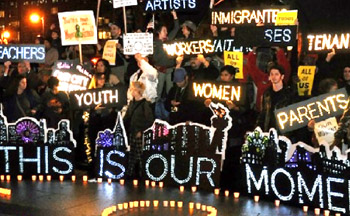 It will take a mass progressive movement to turn our country in a healthier direction. Only a multiracial and cross-class mass movement can limit how much damage the Republican Senate, House and President can do in these coming years. A mass movement could light a fire under the Democratic Party to nominate progressive populists like Bernie Sanders and Senator Elizabeth Warren.
It will take a mass progressive movement to turn our country in a healthier direction. Only a multiracial and cross-class mass movement can limit how much damage the Republican Senate, House and President can do in these coming years. A mass movement could light a fire under the Democratic Party to nominate progressive populists like Bernie Sanders and Senator Elizabeth Warren.
We need a responsive party that is loudly pro-labor, that pushes for full employment policy, that will be firmly anti-sexist and anti-racist, that will tell the truth about how crucial immigrants are to economic growth, and that will treat income inequality as a national crisis. The movement and the party I’m imagining would put forward a progressive populist message that will make sense to economically struggling people of all races and regions.
It’s too early know what effective resistance will be organized to stop the rightward lurch of our country, but when it happens, when you get invitations to join organizations, to boycott, to go to protests and to speak up, please say yes. All of us will need to say yes, say yes, and say yes again.
Betsy Leondar-Wright spoke these words on a panel about race, class and gender in the presidential election, at First Parish UU Church of Arlington, MA on November 13. She is on the board of Class Action (www.classism.org) and on the steering committee of UU Class Conversations (www.uuclassconversations.org ).
Individualism and Universalism
We Are at Our Best in Community
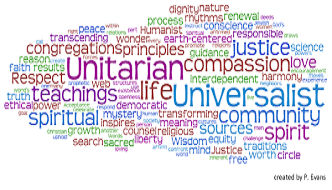 Unitarian Universalism holds that the individual is the highest authority on their own spiritual health and well-being. No one can tell you what your relationship with the universe should be. We recognize that I cannot fully know and understand what your experiences are or how they have shaped you.
Unitarian Universalism holds that the individual is the highest authority on their own spiritual health and well-being. No one can tell you what your relationship with the universe should be. We recognize that I cannot fully know and understand what your experiences are or how they have shaped you.
But, we must be careful not to fall into the idolatry of the world around us, because the relationship is the thing that we strive for.
Covenantal Faith
Our faith is often called “covenantal.” There is no statement of beliefs that you can recite privately to prove that you are a Unitarian Universalist. You have to make, and keep, a promise to a community.
You have to be a participant in relationships to be fully UU. You have to commit to allowing others to talk to you about your values and ideals and question their place in a responsible life.
You have to accept that you will be encouraged to grow your spirit, even when you are comfortable or growth seems hard. We believe that people are at their best when they are giving their best to the community.
It is easy to fall into the idolization of individuality. We all want to be the hero of our own story, and we want the credit for what we accomplish. But a story is no good without people to listen to it, and no one accomplishes anything in a vacuum. Your community, both in your church and beyond its walls, is at its best when we give everyone the opportunity to be an active participant and give their best back to the community.
Shared Responsibility
To do this, we need to be willing, as a community, to give some support and encouragement to people without them having to earn it on our terms. We need every child to receive a quality education, complete nutrition and adequate shelter. That is how we make them into responsible and compassionate citizens.
We need every person to be guaranteed free time from working to explore the things they love, whether that is painting, music, invention or math. This is how we foster invention and the creation of great art.
We need to address income inequality, as well as the classism behind it, so that those who are struggling can be more fully included in their community, having time and energy to participate. It builds a sense of belonging and shared responsibility.
We need to change how we view the social safety net – not as charity for those who are unable but as support for those who might be able to do more if encouraged and allowed.
We need to put community and a sense of shared responsibility on equal footing with individual achievement and success. Real success should factor in the benefits to the city, the nation and the world. People of every class need to be valued not just for what they have, but how they use it and how much of it they give back.
The United States is in danger of being poisoned by a toxic level of individualism. We’ve lost our civic-minded values, and our infrastructure and education are suffering because of it. We must rekindle the warmth of community if we are ever going to restore the fires of innovation and compassion.
Thomas is the founder and administrator for the I Am UU project. He is passionate about building a better world and a beloved community, and he feels that liberal religion is a vital tool in that construction, and that Unitarian Universalism is the best vehicle for introducing liberal religion to the majority of North America.

